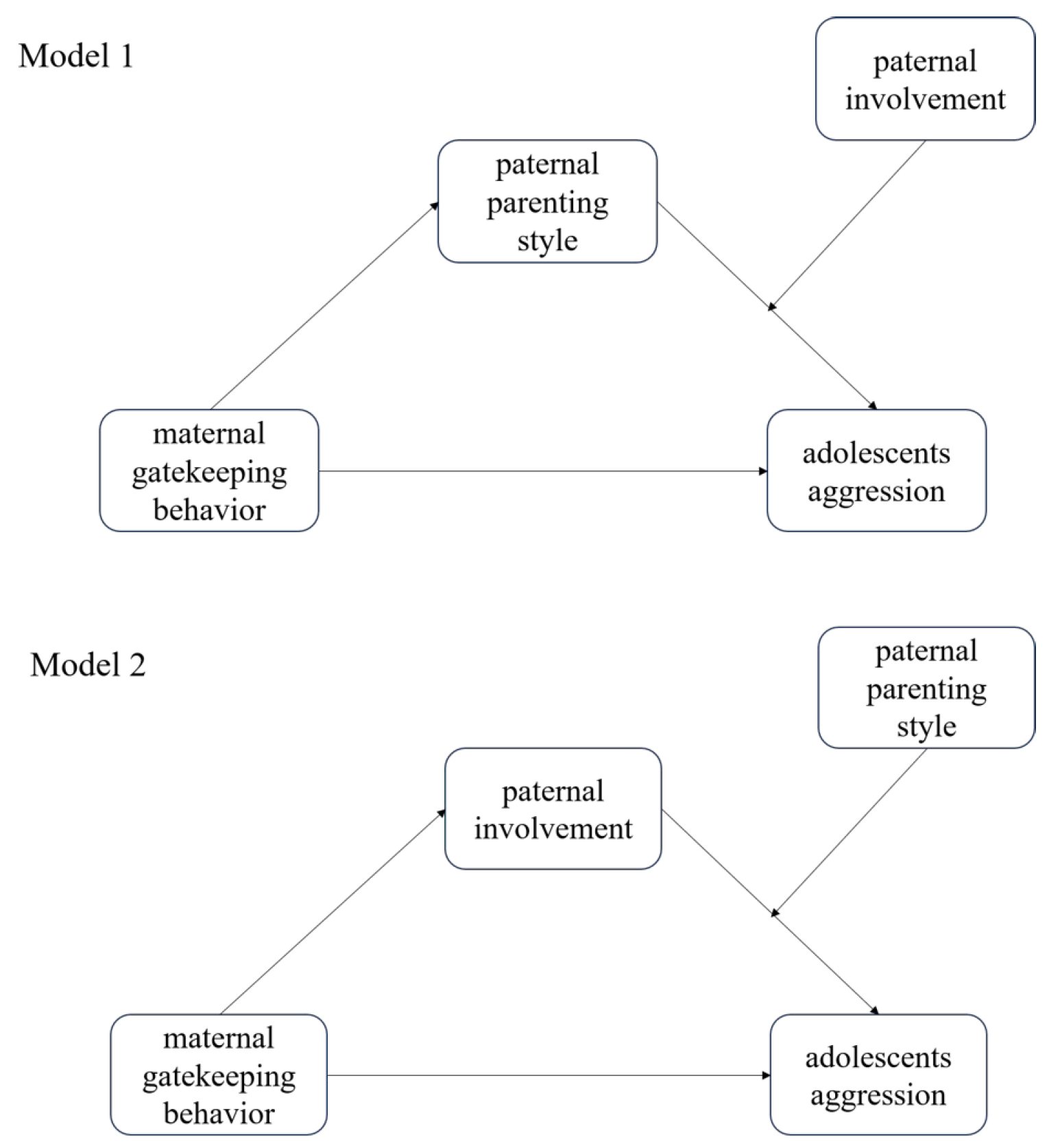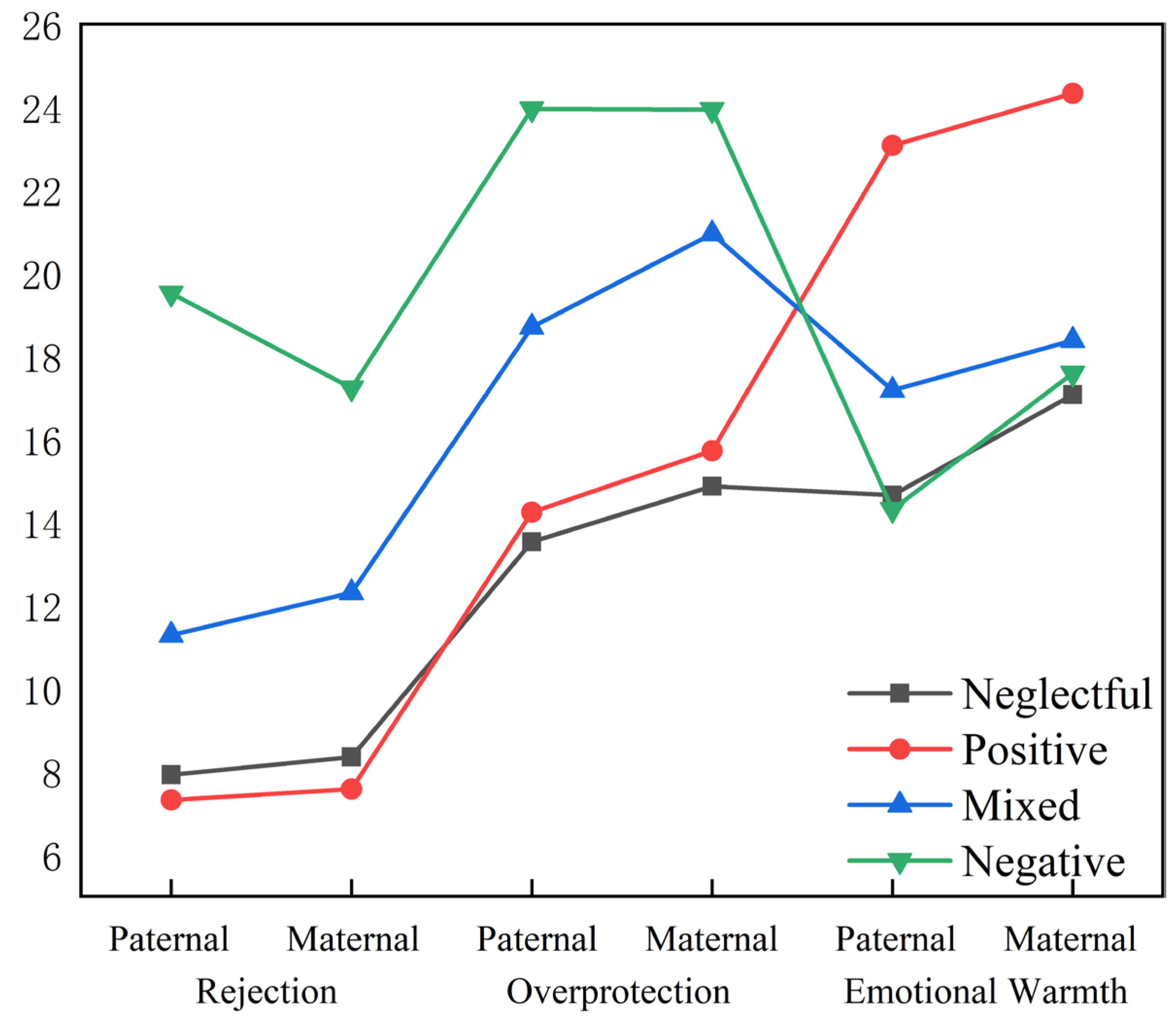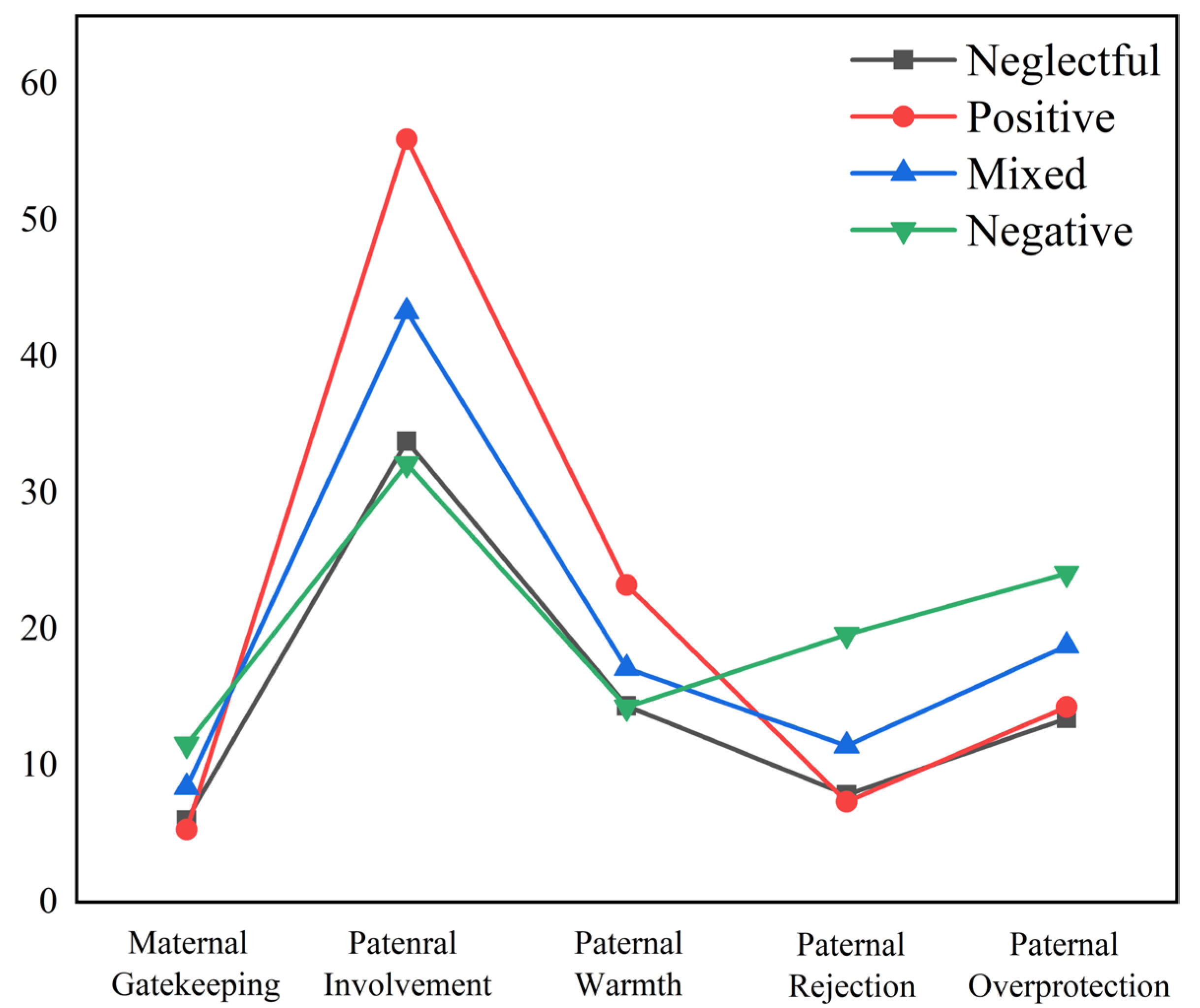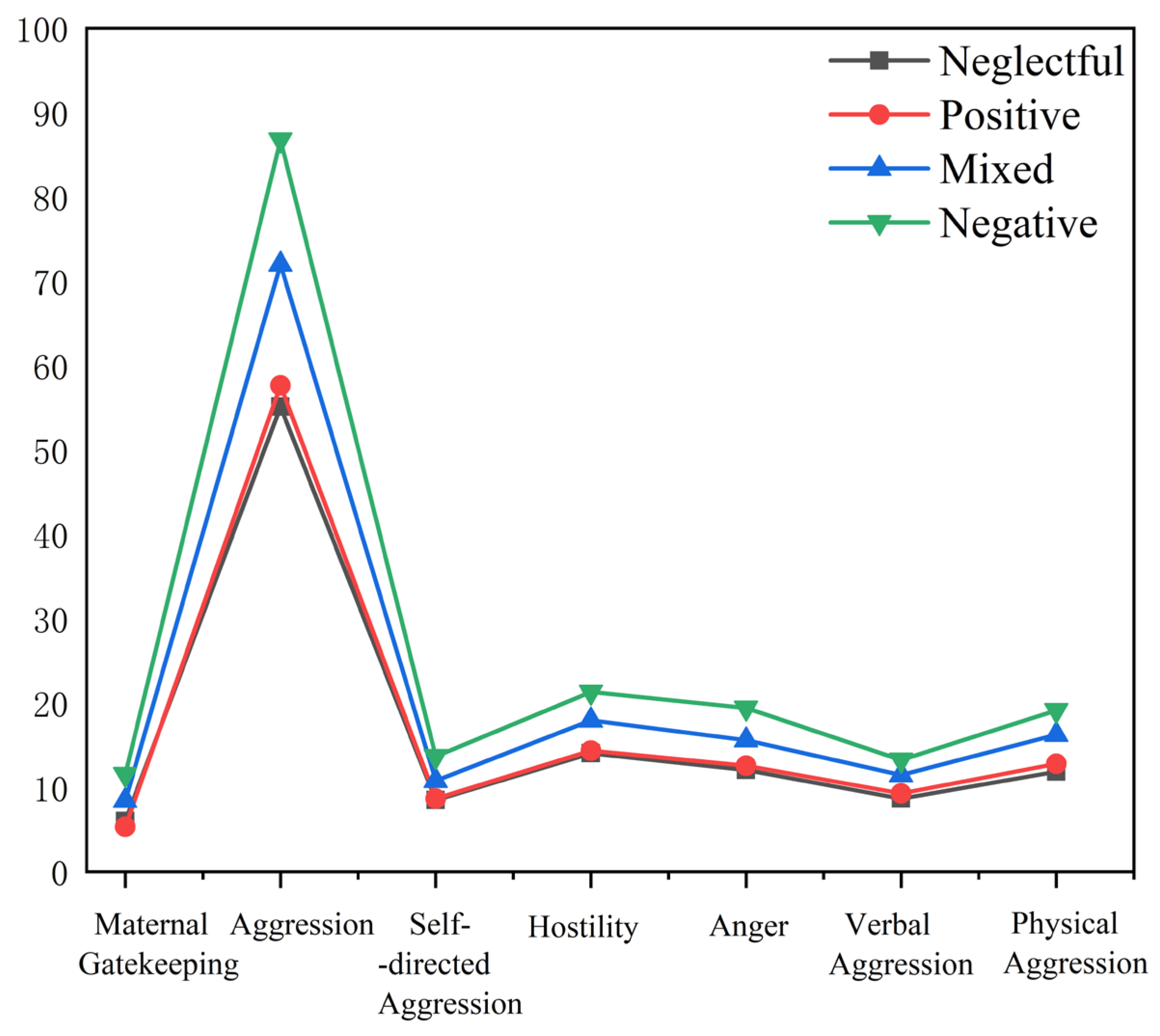1. Introduction
Aggression is an intentional behavior pattern that causes harm to others physically and psychologically [
1]. Aggressive behaviors can take various forms, including physical punishment, bullying, discrimination, pranks, online attacks, among others, with the extreme form being violence. According to a World Health Organization report on youth violence, there are over 176,000 homicides occurring annually among individuals aged 15-29 worldwide, accounting for 37% of the total annual global homicide cases. Furthermore, non-lethal youth violence also has a significant impact on individuals' physical, psychological, and social functioning, which can often be lifelong [
2]. Understanding the causes and predictive factors of aggressive behavior, as well as implementing effective intervention measures, are essential in reducing teenage aggression, maintaining social safety, and promoting healthy individual development.
Teenage aggressive behavior may be caused by their own psychological and emotional issues, as well as influenced by environmental and familial factors. There is evidence to suggest that family-based interventions are more effective than individual interventions [
3], implicated that family plays a crucial role in teenage aggression.
1.1. Parenting Styles and Adolescent Aggression
Parenting style refers to a fixed pattern and tendency of behaviors parents exhibit in their daily interactions with their children, with the parent-child relationship at the center of family life. Multiple empirical studies have shown a significant association between parenting styles and teenage aggressive behavior [
4,
5].
There are various classifications of parenting styles. For example, Braza et al. [
4] differentiated three types of parenting styles based on the interaction of parental warmth and parental control, referring to Baumrind’s [
6] classification: authoritative, authoritarian, and permissive. Different parenting styles have been associated with different externalizing problems in adolescents. For instance, authoritative parenting style (high level of parental warmth and control) has been linked to lower levels of aggression in girls, the combination of an authoritarian maternal style (low on warmth and high on control) and a permissive paternal style is positively associated with aggressive behavior in girls and boys, while higher levels of aggression have been observed in girls when parents adopt permissive parenting style (high on warmth and low on control). Additionally, Song Minghua [
1] categorized parenting styles into positive parenting style (warmth and affection) and negative parenting styles (rejection and overprotection). And more importantly, their measurement incorporated parenting styles of both fathers and mothers [
7], providing more comprehensive information on understanding the relationship between parenting and adolescents’ behaviors. Based on this measurement, parental rejection emerges as a significant predictor of adolescent aggressive behavior [
8,
9,
10]. Similarly, a one-year longitudinal study revealed that early parental rejection positively predicted later externalizing behavior in adolescents [
10], aligning with previous research conducted in Asian countries [
11,
12,
13]. However, these studies measure the overall level of parental rejection by adding up scores from both parents' parenting, the fact that parenting style is not always additive [
14], but interactive [
15], between mothers and fathers has been largely neglected in these studies.
1.1. The Mutual Influence of Parenting between Parents
Family systems theory suggests that the marital subsystem directly affects the overall functioning and parent-child interaction within a family. Due to the traditional division of parental roles, fathers have been considered "outsiders" in child-rearing, resulting in many mothers restricting, controlling, and refusing paternal involvement in household chores and child-rearing activities [
16]. These behaviors of mothers are known as gatekeeping or door-closing behavior. Mothers regulate paternal involvement in child-rearing by either facilitating or inhibiting their role in the co-parenting relationship [
17,
18,
19], including their physical and emotional investment in terms of interaction, accessibility, and responsibility during the children's development [
20]. Rane and McBride [
21] argue that the institution of marriage and the nature of the co-parenting relationship directly influence a father's sense of identity. For example, some researchers argue that gatekeeping behavior operates indirectly through the father's beliefs and self-efficacy in parenting, lowering their level of involvement [
22]. In contrast, maternal gate-opening behavior positively predicts father’s parenting involvement [
23]. Research has shown that maternal gate-opening behaviors can lead to increased father involvement in various aspects, such as caregiving, creating lasting memories with the child, and engaging in play activities [
24].
The maternal gate-keeping behaviors not only exerts a negative impact on paternal involvement in child-rearing, but also leads to a more negative parenting style in fathers, known as the maternal gatekeeping effect [
25]. A pioneering study conducted by Altenburger et al. [
25] explored the longitudinal connection between maternal gatekeeping behavior and the quality of fathers' parenting, and demonstrated that when confronted with maternal gatekeeping behavior, fathers' parenting quality is negatively affected in terms of their responsiveness to infant cues, level of active participation, and the emotional atmosphere during interactions.
Nonetheless, majority of the existing research has primarily concentrated on the impact of maternal gatekeeping behavior on the quantity, namely, fathers' parenting involvement [
25], and less on fathers' parenting styles. More importantly, it should be noted that the quality (paternal parenting style) and the quantity (paternal involvement) often interacted with each other. In Zvara's [
26] study, it was found that in families where fathers exhibit violent tendencies, children are more prone to behavioral problems when fathers' involvement was encouraged. Moreover, previous studies have predominantly focused on gatekeeping behavior and father's parenting involvement in infancy and early childhood, with less attention given to adolescence [
25,
27,
28].
Therefore, this study attempts to address two major questions. First, we examined the latent classes of parenting styles by incorporating both mothers’ and fathers’ parenting styles. Second, we investigated the serial influences of mothers’ gatekeeping behavior, and fathers parenting (including the parenting style as the "quality" and paternal involvement in child-rearing as the "quantity," respectively) on adolescents aggression, and the latter question leads to three hypotheses: (1) the mother's gatekeeping behavior negatively affects adolescents aggression; (2) the mother's gatekeeping behavior negatively affects father's parenting; (3) the father's parenting plays a mediating role between the mother's gatekeeping behavior and adolescent aggression. Based on the hypotheses two, two models were constructed and will be compared: Model 1 considers father's parenting style as the mediating variable between mother's gatekeeping behavior and adolescent aggression, with paternal involvement in child-rearing as the moderating variable in the second half of the mediation process; Model 2 considers paternal involvement in child-rearing as the mediating variable, with father's parenting style as the moderating variable in the second half of the mediation process. By examining the influences of maternal gatekeeping behavior on father's parenting style and involvement, we can gain a better understanding of the interaction between different roles in the family and provide targeted intervention to reduce adolescent aggression.
Figure 1.
Hypotheses model.
Figure 1.
Hypotheses model.
2. Methods
2.1. Subjects
A total of 527 seventh-grade students participated in this study, some from a school in Guangzhou, Guangdong Province, and some from another school in Haikou, Hainan Province. A total of 483 questionnaires were collected, resulting in a response rate of 91.65%. The participants had an average age of 12.66±0.80 years, with 249 males and 234 females.
2.2. Self-Repot Measurements
2.2.1. The Maternal Gatekeeping Behavior Perception Questionnaire
The Maternal Gatekeeping Behavior Perception Questionnaire for adolescents was adapted from the Maternal Gatekeeping Behavior Questionnaire translated and developed by Zou Shengqi [
15]. It consists of 11 items with two dimensions: "Perceived Maternal Gate Opening Behavior" and "Perceived Maternal Gate Closing Behavior." The Likert scale ranges from 0 to 6, with response options "Never," "Rarely," "Seldom," "Sometimes," "Often," "Very often," and "Extremely often." The Perceived Maternal Gate Closing Behavior dimension includes 7 items, measuring adolescents' perception of maternal rejection and restriction of paternal involvement in parenting. Higher scores indicate a greater perception of maternal gate closing behavior. For example, an item is "My mom controls the time my dad spends with me." Perceived Maternal Gate Opening Behavior dimension includes 4 items, measuring adolescents' perception of maternal acceptance and support for paternal involvement in parenting. For example, an item is "My mom speaks positively about my dad in front of me." In this study, the Cronbach's α coefficient for the Gate Closing dimension was 0.72, and for the Gate Opening dimension was 0.78.
2.2.2. Adolescent Evaluation of Parental Involvement Behavior Questionnaire
In this study, the Adolescent Evaluation of Parental Investment Behavior Questionnaire developed by Wu Xinchun et al. [
29] was used to measure the level of paternal investment in parenting. This questionnaire is completed by adolescents and is used to assess their perception of paternal involvement in parenting. The questionnaire consists of 4 dimensions and a total of 22 items. The "Emotional Leisure" dimension includes 11 items, the "Rule Teaching" dimension includes 3 items, the "Academic Support" dimension includes 4 items, and the "Life Care" dimension includes 4 items. The Likert scale ranges from 0 to 4, with response options "Never," "Occasionally," "Sometimes," "Often," and "Always." Higher scores on a particular dimension indicate that adolescents perceive higher levels of paternal investment in that dimension. In this study, the Cronbach's α coefficients for the four dimensions ranged from 0.72 to 0.93.
2.2.3. Short Form of Parental Rearing Style Questionnaire
The Short form of Parenting Rearing Style questionnaire was used in this study to measure the parenting styles of adolescents' parents. It was originally developed by Arrindell et al. [
30] and subsequently revised by Jiang et al. [
7]. The revised scale not only reduced the number of items but also ensured its cultural appropriateness. The questionnaire consists of 3 dimensions and a total of 21 items. The "Rejection" dimension includes 6 items, the "Emotional Warmth" dimension includes 7 items, and the "Overprotection" dimension includes 8 items. The items are scored on a scale of 1 to 4, with response options "Never," "Occasionally," "Often," and "Always." Seventeen items are reverse-scored. The higher the score in a particular dimension for either the father or mother, the more that parenting style is associated with that type. Parenting styles can differ between fathers and mothers. This study refers to the research by Song Minghua et al. [
1] and explores parenting styles from the perspectives of positive parenting styles (including the Emotional Warmth dimension) and negative parenting styles (including the Rejection and Overprotection dimensions). In this study, the Cronbach's α coefficients for the three dimensions of the father version ranged from 0.69 to 0.87, and for the mother version, they ranged from 0.71 to 0.85.
2.2.4. Buss and Perry Aggression Questionnaire
The Chinese version of the Buss and Perry Aggression Questionnaire, translated and revised by Li Xianyun et al. [
31], was used in this study to measure the level of aggression in adolescents. The questionnaire consists of 5 dimensions and a total of 30 items. The "Physical Aggression" dimension includes 7 items, the "Verbal Aggression" dimension includes 5 items, the "Anger" dimension includes 6 items, the "Hostility" dimension includes 7 items, and the "Self-directed Aggression" dimension includes 5 items. The items are scored on a Likert scale of 1 to 5, with response options "Not at all," "Slightly," "Moderately," "Quite a bit," and "Extremely." Higher scores indicate higher levels of aggression in an individual. In this study, the Cronbach's α coefficients for the five dimensions ranged from 0.71 to 0.85.
2.3. Procedure
In this study, the paper version of the questionnaire was administered. To protect student privacy, the entire administration process was conducted anonymously upon the approval of them and their parents. The collected questionnaires were examined by undergraduate psychology students to remove any that did not adhere to the response guidelines or had unclear content. The data were then saved and managed in SPSS 22.0 for statistical analysis.
2.4. Statistical Analysis
Descriptions and correlation analyses of each variable were performed with SPSS 22.0. Mediation analyses were conducted based on the proposed model 1 and model 2 with SPSS PROCESS macro, with gender as a covariate. Mediation effects were confirmed after 5,000 bias-corrected bootstrapping (p < 0.05).
The Latent profile analysis was conducted with M-plus 7.0. Among the six fit indices used to select the latent class model, smaller values of AIC, BIC, and ABIC indicate better model fit. Some scholars have suggested that BIC is the preferred fit index among these three [
32,
33]. The entropy value represents the accuracy of individual classification, with higher values indicating better model fit. Generally, a value above 0.8 indicates higher classification accuracy. The p-values of LMR LR and BLRT tests less than .05 indicate that the k-class model is superior to the k-1 class model [
34].
To better address the mutual relationship between parents and to exclude potential confounds between different types of family structures, we analyzed the whole sample which includes conventional families (live with parents) and non-conventional families (divorce or single family et al.), and the samples from conventional families only.
2.5. Common Method Bias
To control for common method bias, this study employed anonymous administration and reverse scoring for some items. Two different schools were involved. After collecting the data, Harman's single-factor test was used. The results revealed 27 unrotated common factors with eigenvalues greater than 1. The largest factor accounted for 17.43% of the variance, indicating that there was no severe common method bias in this study.
3. Results
3.1. Demographics
Based on the family structure, we found differences between conventional families and nonconventional families in several variables. In general, the conventional family had lower mother gate-keeping behavior, more positive parenting from both parents, and less adolescents’ aggression compared with non-conventional families (Table 1).
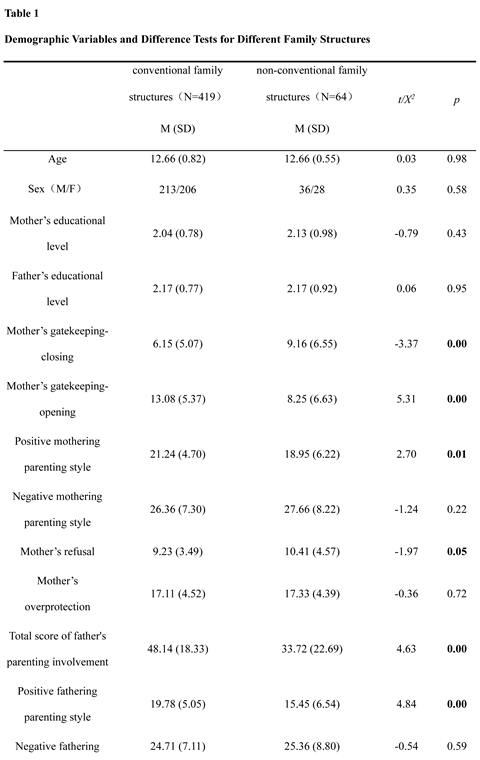
3.2. Latent Profile Analysis
To explore the latent categories of parental rearing styles, three parenting styles (rejection, emotional warmth, overprotection) were used as observed variables. The latent profiles of parental rearing styles were analyzed using one, two, three, and four latent class models. The fit results of the analysis model are shown in Table 2. Based on the LMR LR test, the three-class model is superior to the two-class model, and the two-class model is superior to the one-class model. However, comparing the three-class model and the four-class model, it was found that the three-class model actually combines the low negative-low positive and low negative-high positive classes into one class. Taking into account the fit information mentioned above, the four-class model was ultimately chosen as the final model for latent profile analysis. The four classes are positive (positive parenting from both parents, 48.97%), negative (negative parenting from both parents, 6.82%), mixed (medium positive/negative parenting from both parents, 19.42%) and neglectful (low positive and negative parenting from both parents, 24.79%) (
Figure 2).
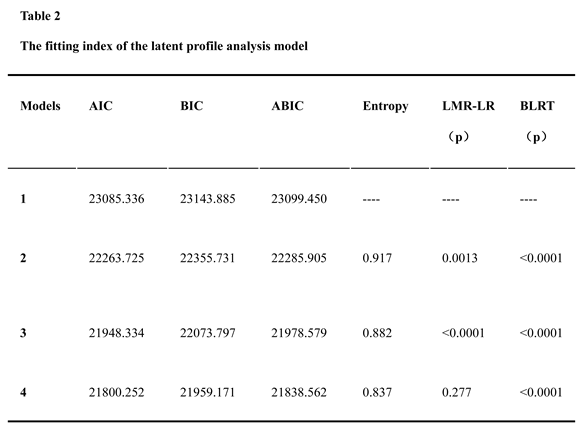
3.3. Validity of the Latent Profile Analysis Results
To validate the effectiveness of the latent categories of parental rearing styles, analysis of variance (ANOVA) was conducted with parental rearing style categories as the independent variable and maternal gatekeeping behavior, paternal parenting and paternal involvement (
Figure 3), and adolescent aggression (
Figure 4) as the dependent variables. The results revealed significant differences in the scores of maternal gatekeeping behavior (
F (2,192) = 101.750,
p < 0.001), paternal parenting involvement (
F (2,192) = 101.750,
p < 0.001), and adolescent aggression (
F (2,192) = 101.750,
p < 0.001) across different latent categories of parental rearing styles.
3.4. Correlation Analysis
Among all subjects, Pearson correlation analysis showed that maternal gatekeeping behavior and parents' negative parenting style were significantly positively correlated with adolescent aggression. In addition, both paternal positive parenting style and paternal parenting involvement were significantly negatively correlated with adolescent aggression. Moreover, maternal gatekeeping behavior was significantly positively correlated with paternal negative parenting style and significantly negatively correlated with paternal positive parenting style and parenting involvement (Table 3). Interestingly, maternal gatekeeping behavior was also positively correlated with maternal negative parenting style (p < 0.01).
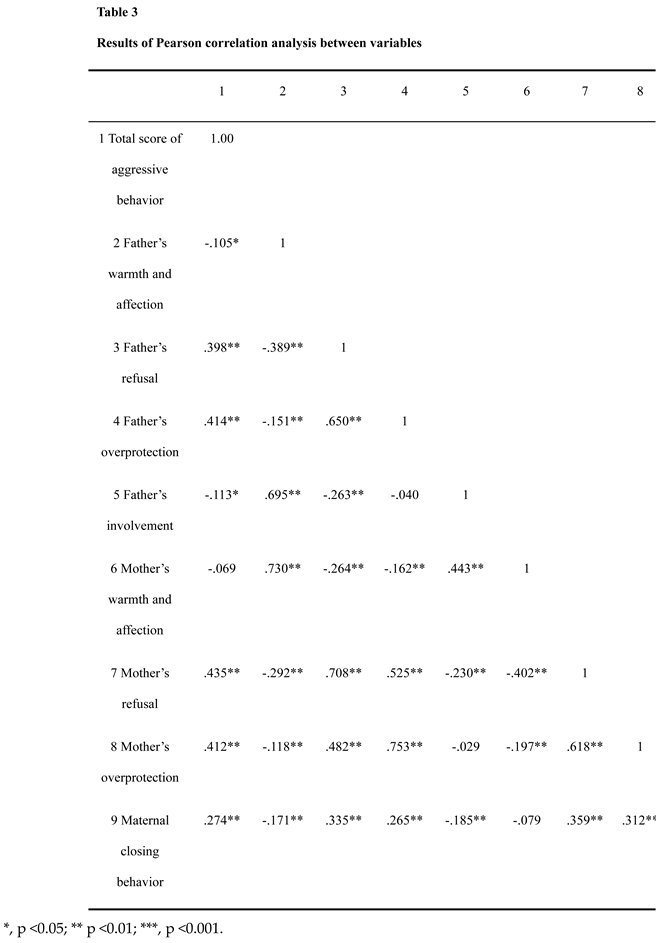
3.5. Moderated Mediation Model
In order to examine the relationship between the quality and quantity of paternal parenting and maternal gatekeeping behavior and adolescent aggression, this study proposed two moderated mediation models. The results indicated significant effects for both models. However, when comparing the two models, Model 1 had an R2 of 0.13 (F = 32.23, p < 0.0001), while Model 2 had an R2 of 0.05(F = 32.34, p < 0.0001), suggesting that Model 1 was superior to Model 2. According the modulation effect, the negative impact of negative paternal parenting is more pronounced when fathers are more involved.
Further examination of Model 1 revealed that when the paternal negative parenting style was divided into rejection and overprotection, only the scores of paternal rejections showed a significant mediating effect (F = 26.35, p < 0.0001). This suggests that mothers’ gate-keeping behavior is more closely related to fathers' rejection which increased adolescent aggression.
Importantly, all of the above results almost remained the same when analyzing in the conventional families only (supplemental materials).
4. Discussion
The present study advances our understanding of potential influences on parental interactions with adolescents’ aggression. Through latent profile analysis, this paper categorizes paternal parenting styles into four types: positive, negative, mixed and neglectful. Each classes demonstrated significant differences in maternal and paternal parenting, as well as in adolescents’ aggression. The uniqueness of this study lies in simultaneously considering the influences of maternal gatekeeping behavior on quality and quantity of paternal parenting, and the serial influences on adolescent aggressive behavior.
4.1. The Difference between Different Classification of Pareting Styles
Our findings indicate that the parenting styles of fathers and mothers are relatively consistent, with fathers and mothers exhibited similar levels of positive and negative behaviors within each type. As an essential component of parent-child interaction, parenting styles have a lasting impact on individuals' lifelong development [
35]. Research have repeatedly indicated that parenting styles may influence teenage aggression [
36,
37], with different types of parenting styles can effectively predict adolescent aggressive behavior.
In families demonstrated with negative parenting style for example, mothers exhibit the highest level of closing behavior, and fathers exhibit the highest level of negative parenting and lowest involvement, and adolescents display the highest aggressive behavior, which is consistent with the findings of Luo Guiming [
38]. The research findings were validated in the overall sample and conventional families.
On the contrary, under the positive parenting style, mothers exhibit the least amount of closing behavior, and fathers exhibit the lowest level of negative parenting and highest involvement, and adolescents display the lowest aggressive behavior. Out of our expectation, adolescents from families of neglectful parenting also demonstrated the lowest aggressive behavior. The similarity between the two types of families leads to a possibility that, it is the lowest negative paternal parenting (including paternal rejection and overprotection) contribute to lowest adolescent aggression. There are other studies that support this interpretation [
8,
9,
10].
4.2. The Relationship between Maternal Gatekeeping and Paternal Parenting Quality and Adolescent Aggressive Bahavior
In line with this interpretation, we found the negative paternal parenting plays a significant role in predicting adolescents aggression, and more importantly, the negative paternal parenting may be a unfavorable result of maternal gatekeeping [
4]. The combination of maternal gatekeeping and negative paternal parenting contribute to adolescents aggression based on several reasons [
39,
40,
41].
For one thing, gatekeeping behavior may undermine marital relationships. The family systems theory suggests that mothers’ restriction or negative judgement of paternal parenting might create marital conflicts which are often regarded as detrimental environmental stimuli and direct triggers for various psychological, social, and emotional issues in adolescents. Moreover, the parental conflicts also induce negative emotion, emotional insecurity, and lower self-efficacy of their children [
41]. According to the general aggression model, both toxic external environment and internal personal traits and emotions states lead to aggressive behavior. For the other thing, the studies on the spillover hypothesis and the cascading transmission of parental conflicts indicate that adolescents' aggressive behaviors might be an imitation of their parents' conflict resolution strategies. The social learning theory [
42] suggests that through observation, imitation, and reinforcement, individuals developed patterns of conflict resolution learned from family interactions, which can then be transferred to peer interactions. Therefore, the behaviors and consequences of parental conflicts may lead adolescents to perceive dominating, rather than cooperating, is a good way to survive conflicts.
Further analysis found the mediated effect of negative parenting is mainly driven by paternal rejection, rather than overprotection, implicated that parental refusal, compared with overprotection, is more likely to lead to aggressive behavior. It has been reported that parents’ refusal is long-term pressures of life that can hinder children's self-control abilities [
43], which is a core factor in triggering aggressive behavior [
44]; while overprotective for children often leads to internalizing problems such as anxiety, depression, and withdrawal, as it conveys the incorrect belief that the outside world is uncontrollable and diminishes children's self-awareness and emotional well-being [
45]. There at least two explanations for the closer relationship between paternal refusal and adolescent aggression. Firstly, children who experience parental rejection are more likely to experience frustration, which in turn can lead to the emergence of aggressive behavior according to frustration-aggression theory [
46,
47]. Secondly, empirical evidence has demonstrated that children who experience parental rejection tend to have low self-esteem and poor self-adjustment, along with unstable emotions and negative worldviews [
48], especially the rejection from fathers [
49]. Where there is a close connection between low self-esteem and externalizing problems [
50], it is highly possible that aggression has been adopted as a tool to restore one’s self-esteem, especially in those adolescents who believe aggression is “cool” [
51].
Strikingly, under the negative paternal parenting, the more the father involved, the worse of the adolescent aggression. This is consistent with the findings of Zvara [
26]. It is likely that an increase in negative parenting practices by fathers leads to more family conflict, causing more frustration to adolescents, decreasing adolescent self-esteem and self-control more remarkably. This, in turn, leads to an increase in aggressive behavior.
Overall, we have demonstrated the proposed model that mothers’ gatekeeping behavior significantly influence fathers’ parenting and subsequently, leads to higher adolescents’ aggression. The observed results could not rule out the other possibility that it is the fathers’ negative parenting causes mother’s gatekeeping behavior, that is to say, when mothers are dissatisfied with paternal involvement or parenting approaches, gatekeeping behavior may occur through positive or negative feedback loops [
52]. Hence, it is highly possible that paternal negativity may induce the maternal gate-keeping behavior [
53]. But empirical study revealed that paternal characteristics, compared with maternal characteristics, have a relatively smaller predictive effect on maternal gatekeeping behavior [
54]. For example, a perfectionistic mother may have higher expectations for the father’s parenting behavior. This may lead to low parenting confidence and limited experience for the father, making it difficult for him to meet the mother’s standards, thus reinforcing the mother’s gate-closing behavior. Schoppe-Sullivan et al. [
54] revealed that mothers with a belief in their superior parenting skills or mothers with high parenting efficacy are more likely to exert control over the father's parenting style and involvement, leading to more gate-closing behavior. But to our surprise, this study found that maternal gate-closing behavior was significantly associated with mothers’ negative, rather than positive parenting practices. Kulik & Tsoref [
55] found that the more traditional a mother’s gender role consciousness, the more likely she is to believe that the partner is incapable of taking care of the child, leading to higher levels of gate-closing behavior. Additionally, the intimacy of the marital relationship also influences maternal gatekeeping behavior [
21]. Future longitudinal studies might be able to address these questions with incorporating these variables and with cross-lagged analyses.
5. Limitation
This study not only investigates the influence of maternal gatekeeping behavior on paternal caregiving behavior but also extends the research on the impact of maternal gatekeeping behavior to the adolescent domain. Additionally, it incorporates both the quality and quantity of paternal parenting into the study, making the pathways through which maternal gatekeeping behavior affects adolescent aggressive behavior more evident.
However, this study still has the following limitations. Firstly, employing self-report methods for adolescents to measure perceived maternal gatekeeping behavior and perceived parental parenting styles may lead to discrepancies between perception and reality. Future research could utilize a multi-actor-multi-method approach to measure family variables. Secondly, the study adopts a cross-sectional design, which does not establish causal relationships between maternal gatekeeping behavior, paternal parenting quality, and adolescent aggressive behavior. As mentioned above, it is possible that the negative paternal parenting induces maternal gatekeeping behaviors. Longitudinal studies used cross-lagged analysis may provide answer for this query. Lastly, this study assumes a traditional family structure where the father is the primary breadwinner and the mother is the primary caregiver. However, the effects of this dynamic in atypical family structures, such as cases where the father is the primary caregiver and the mother is the primary breadwinner, remain to be investigated. After all, both parents are capable of engaging in door-closing behaviors [
52]. Additionally, this study did not measure any factors that might influence mothers’ gatekeeping behavior, such as mothers’ perfectionism, parenting efficacy, as well as marital quality. Although it primarily focused on families where parents live together, the marital quality can vary significantly within cohabitating families. Therefore, this aspect can be explored in future research.
6. Conclusions
Grounded in the traditional Chinese cultural belief of "men as breadwinners and women as homemakers" and in line with the trend of societal development, this study explored the effects of maternal gatekeeping behavior on paternal parenting quality and quantity, as well as adolescent aggressive behavior, taking into account the systemic and interactive features of modern families. In addition, this study also attempts to comprehensively explain the causes of adolescent aggressive behavior from the perspective of the family system.
Based on the co-parenting system theory, mothers should reduce criticism and blame towards the quality and quantity of paternal parenting while actively parenting children, helping and supporting paternal parenting behaviors, and discussing child-rearing matters with fathers on an equal footing. Fathers should avoid excessive harshness and control in parenting children, offering more respect and autonomy to adolescents during their teenage years.
Supplementary Materials
The supplemental materials are online Preprints.org.
Author Contributions
H.Y.Wang contributed in discussion and paper writing; P.J.Xu: contributed in the research idea, date collecting and data analysis; Y.L.Jiang is the principal investigator of this study, and contributed in data analysis, discussing, and reviewing.
Funding
This study is supported by Guangdong Basic and Applied Basic Research Foundation (2021A1515011359), and MOE (Ministry of Education in China) Project of Humanities and Social Sciences (23YJC190012).
Institutional Review Board Statement
Not applicable.
Informed Consent Statement
Informed consent was obtained from all subjects involved in the study.
Data Availability Statement
The raw data supporting the conclusions of this article will be made available the authors, without undue reservation.
Conflicts of Interest
The authors declare no conflicts of interest.
References
- Song, M. H. et al. Effects of parenting styles on aggression of junior school students: Roles of deviant peer affiliation and self-control. Psychological Development and Education 2017, 33, 675–682.
- Felitti, V. J. et al. Relationship of Childhood Abuse and Household Dysfunction to Many of the Leading Causes of Death in Adults: The Adverse Childhood Experiences (ACE) Study. American Journal of Preventive Medicine 1998, 14, 245–258. [CrossRef]
- Vidal, S. et al. Treatment effects of parent-child focused evidence-based programs on problem severity and functioning among children and adolescents with disruptive behavior. Journal of Clinical Child & Adolescent Psychology 2019, 48, S326–S336. [CrossRef]
- Braza, P. et al. Negative Maternal and Paternal Parenting Styles as Predictors of Children’s Behavioral Problems: Moderating Effects of the Child’s Sex. Journal of child and Family Studies 2015, 24, 847–856. [CrossRef]
- Casas, J. F. et al. Early parenting and children’s relational and physical aggression in the preschool and home contexts. Journal of Applied Developmental Psychology 2006, 27, 209–227. [CrossRef]
- Baumrind, D. Current patterns of parental authority. Developmental Psychology 1971, 4, 1–103. [CrossRef]
- Jiang, J. et al. Revision of the Short-form Egna Minnen av Barndoms Uppfostran for Chinese,s-EMBU-C. Psychological Development and Education 2010, 26, 94–99.
- Zhang, S. S. et al. The effect of parental rejection on aggressive behavior in left-behind children: A moderated mediated model. Journal of Guizhou Normal University (Natural Sciences) 2022, 40, 107–113.
- Wang, J. M. et al. The Association between Parental Rejection and Peer Rejection among Children: The Mediating Role of Problem Behaviors and the Moderating Role of Home Chaos. Psychological Development and Education 2021, 37, 845–853.
- Huang, L. H. et al. The Bidirectional Associations between Parental Rejection and Externalizing Problems among Chinese Adolescents. Chinese Journal of Applied Psychology 2022, 28, 125–133.
- Han, Y. et al. Application of social control theory to examine parent, teacher, and close friend attachment and substance use initiation among Korean Youth. School Psychology International 2016, 37, 340–358. [CrossRef]
- Hoeve, M. et al. The Relationship Between Parenting and Delinquency: A Meta-analysis. Journal of Abnormal Child Psychology 2009, 37, 749–775. [CrossRef]
- Yun, H.-J. et al. The Mediating Roles of Adolescent Disclosure and Parental Knowledge in the Association Between Parental Warmth and Delinquency Among Korean Adolescents. Journal of child and Family Studies 2016, 25, 2395–2404. [CrossRef]
- Huang, C. H. et al. Association of family functioning and parental styles with anxiety symptoms among high-grade primary school students. Chinese Journal of School Health 2024, 1–5.
- Zou, S. Q. et al. The effect of Maternal Gatekeeping: Concept, theory and prospective. Journal of Beijing Normal University (Social Sciences) 2016, 41–49.
- Allen, S. et al. Maternal Gatekeeping: Mothers’ Beliefs and Behaviors That Inhibit Greater Father Involvement in Family Work. Journal of Marriage and the Family 1999, 61, 199. [CrossRef]
- DeLuccie, M. F. Mothers as Gatekeepers: A Model of Maternal Mediators of Father Involvement. The Journal of Genetic Psychology 1995, 156. [CrossRef]
- Fagan, J. & Cherson, M. Maternal Gatekeeping: The Associations Among Facilitation, Encouragement, and Low-Income Fathers’ Engagement with Young Children. Journal of Family Issues 2017, 38, 633–653. [CrossRef]
- McBride, B. A. et al. Paternal Identity, Maternal Gatekeeping, and Father Involvement*. Family Relations 2005, 54, 360–372. [CrossRef]
- Wu, X. C. et al. The Characteristics of Father Involvement and Its Related Influencing Factors. Journal of South China Normal University (Social Science Edition) 2014, 163, 88–95.
- Rane, T. R. & McBride, B. A. Identity Theory as a Guide to Understanding Fathers’ Involvement with Their Children. Journal of Family Issues 2000, 21, 347–366. [CrossRef]
- Liu, Y. et al. The effect of parental beliefs and maternal gatekeeping behavior on paternal involvement in parenting. In Chinese Psychological Society. Beijing, China. (2, 11, 2018).
- Zou, S. Q. et al. Maternal Gatekeeping Behavior and Father-Adolescent Attachment: The Mediating Role of Father Involvement. Journal of Psychological Science 2019, 42, 1361–1367.
- Fagan, J. & Barnett, M. The Relationship between Maternal Gatekeeping, Paternal Competence, Mothers’ Attitudes about the Father's Role, and Father Involvement. Journal of Family Issues 2003, 24, 1020–1043. [CrossRef]
- Altenburger, L. E. et al. Associations Between Maternal Gatekeeping and Fathers’ Parenting Quality. Journal of child and Family Studies 2018, 27, 2678–2689. [CrossRef]
- Zvara, B. J. et al. Intimate Partner Violence, Maternal Gatekeeping, and Child Conduct Problems. Family Relations 2016, 65, 647–660. [CrossRef]
- Chung, M. R. et al. The Relationship Between Maternal Gatekeeping and Paternal Parenting: The Mediating Effects of Marital Communication. Korean Journal of Childcare and Education 2015, 11, 355–373.
- Gaunt, R. Maternal Gatekeeping: Antecedents and Consequences. Journal of Family Issues 2008, 29, 373–395. [CrossRef]
- Wu, X. C. et al. Psychometric Properties of the Adolescence Revision of Paternal Involvement Behavior Questionnaire. Chinese Journal of Clinical Psychology 2018, 26, 647–651. [CrossRef]
- Arrindell, W. A. et al. The development of a short form of the EMBU1: Its appraisal with students in Greece, Guatemala, Hungary and Italy. Personality and Individual Differences 1999, 27, 613–628. [CrossRef]
- Li, X. Y. et al. Development, Reliability and Validity of the Chinese version of Buss & Perry Aggression Questionnaire. Chinese Journal of Nervous and Mental Diseases 2011, 37, 607–613.
- Burnham, K. P. & Anderson, D. R. Multimodel Inference: Understanding AIC and BIC in Model Selection. Sociological Methods & Research 2004, 33, 261–304. [CrossRef]
- Nylund, K. L. et al. Deciding on the Number of Classes in Latent Class Analysis and Growth Mixture Modeling: A Monte Carlo Simulation Study. Structural Equation Modeling: A Multidisciplinary Journal 2007, 14, 535–569. [CrossRef]
- Jung, T. & Wickrama, K. A. S. An Introduction to Latent Class Growth Analysis and Growth Mixture Modeling. Social and Personality Psychology Compass 2008, 2, 302–317. [CrossRef]
- Álvarez-García, D. et al. Predictors of school bullying perpetration in adolescence: A systematic review. Aggression and Violent Behavior 2015, 23, 126–136. [CrossRef]
- Marçal, K. E. Pathways to Adolescent Emotional and Behavioral Problems: An Examination of Maternal Depression and Harsh Parenting. Child Abuse & Neglect 2021, 113, 104917. [CrossRef]
- Özdemir, Y. et al. Parenting processes, self-esteem, and aggression: A mediation model. European Journal of Developmental Psychology 2017, 14, 509–532. [CrossRef]
- Luo, G. M. Researches on the Relationships Among Parental Rearing Style, Self-esteem and Aggression in College Students. Chinese Journal of Clinical Psychology 2008, 198–199.
- Xia, T. S. et al. The Effect of Interparental Conflicts on Adolescents' Aggressive Behavior: A Moderated Mediation Model. Psychological Development and Education 2016, 32, 503–512.
- Yang, J. P. & Wang, X. C. Interparental Conflict and Aggressive Behavior: The Mediating Effect of the Moral Disengagement. Psychological Development and Education 2011, 27, 498–505.
- Chen, T. et al. The Effect of Inter-parental Conflict on Aggression of Junior Middle School Student: The Chain Mediating Role of Regulatory Emotional Self-Efficacy and Emotional Insecurity. Chinese Journal of Clinical Psychology 2020, 1038-1041+1037.
- Bandura, A. Aggression: A Social Learning Analysis. Stanford Law Review 1973, 26, 239. [CrossRef]
- Zhao, J. X. Parental Monitoring and Left-behind-children's Antisocial Behavior and Loneliness. Chinese Journal of Clinical Psychology 2013, 21, 500–504.
- Anderson, C. A. & Bushman, B. J. Human aggression. Annual Review of Psychology 2002, 53, 27–51. [CrossRef]
- McShane, K. E. & Hastings, P. D. The New Friends Vignettes: Measuring parental psychological control that confers risk for anxious adjustment in preschoolers. International Journal of Behavioral Development 2009, 33, 481–495. [CrossRef]
- Berkowitz, L. Frustrations, appraisals, and aversively stimulated aggression. Aggressive Behavior 1988, 14, 3–11. [CrossRef]
- Golubeva, E. & Istratova, O. Study of Frustration in Children Emotionally Rejected by Their Parents. Spaces 2018, 39.
- Gracia, E. et al. Parental rejection and psychosocial adjustment of children. Salud Mental 2005, 28, 73–81.
- Khaleque, A. & Rohner, R. P. Transnational Relations Between Perceived Parental Acceptance and Personality Dispositions of Children and Adults: A Meta-Analytic Review. Personality and Social Psychology Review 2012, 16, 103–115. [CrossRef]
- Donnellan, M. B. et al. Low Self-Esteem Is Related to Aggression, Antisocial Behavior, and Delinquency. Psychological Science 2005, 16, 328–335. [CrossRef]
- Rudolph, K. D. et al. Developing Relationships, Being Cool, and Not Looking Like a Loser: Social Goal Orientation Predicts Children’s Responses to Peer Aggression. Child Development 2011, 82, 1518–1530. [CrossRef]
- Altenburger, L. E. Similarities and differences between coparenting and parental gatekeeping: Implications for father involvement research. Journal of Family Studies 2023, 29, 1403–1427. [CrossRef]
- Sano, Y. et al. Are Mothers Really “Gatekeepers” of Children? Rural Mothers’ Perceptions of Nonresident Fathers’ Involvement in Low-Income Families. Journal of Family Issues 2008, 29, 1701–1723. [CrossRef]
- Schoppe-Sullivan, S. J. et al. Who Are the Gatekeepers? Predictors of Maternal Gatekeeping. Parenting 2015, 15, 166–186. [CrossRef]
- Kulik, L. & Tsoref, H. The entrance to the maternal garden: Environmental and personal variables that explain maternal gatekeeping. Journal of Gender Studies 2010, 19, 263–277. [CrossRef]
|
Disclaimer/Publisher’s Note: The statements, opinions and data contained in all publications are solely those of the individual author(s) and contributor(s) and not of MDPI and/or the editor(s). MDPI and/or the editor(s) disclaim responsibility for any injury to people or property resulting from any ideas, methods, instructions or products referred to in the content. |
© 2024 by the authors. Licensee MDPI, Basel, Switzerland. This article is an open access article distributed under the terms and conditions of the Creative Commons Attribution (CC BY) license (http://creativecommons.org/licenses/by/4.0/).
